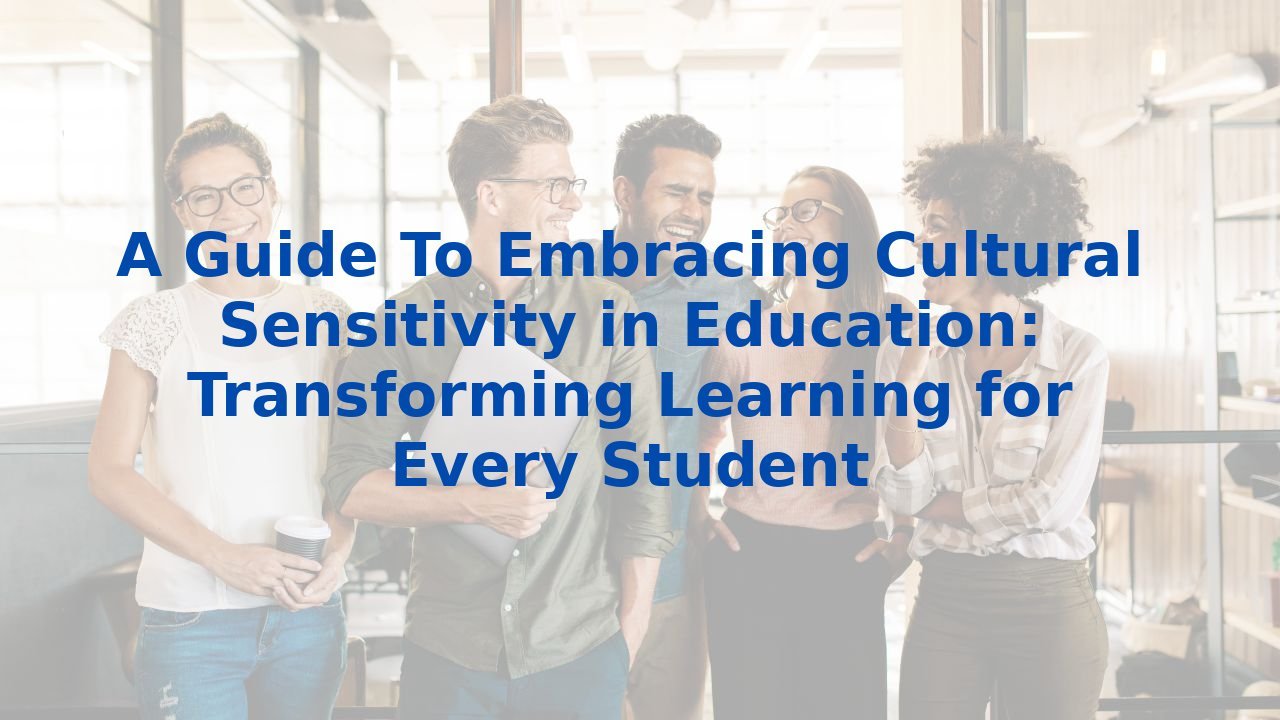A Guide To Embracing Cultural Sensitivity in Education: Transforming Learning for Every Student
A Guide To Embracing Cultural Sensitivity in Education: Transforming Learning for Every Student
Introduction
In the evolving landscape of education, cultural sensitivity emerges as a crucial element for creating a more inclusive atmosphere. Embracing the profound diversity that exists within our classrooms not only enriches educational experiences but elevates the potential of every student. This guide looks at the importance of cultural sensitivity in education, explores inclusive practices, and positions AI as a transformative ally in these endeavors.
The Importance of Cultural Sensitivity
Cultural sensitivity stands as a pillar in the educational experience, recognizing and honoring the unique backgrounds of each student. It fosters a learning environment where every individual feels valued and understood. Research underscores that culturally relevant practices can dramatically enhance educational experiences, particularly for marginalized communities. As educators strive to create safe and nurturing spaces, acknowledging and integrating diverse cultural perspectives becomes essential.
Inclusive Practices
To foster a truly inclusive educational system, several key strategies can be implemented:
- Representation in Education: Highlighting the achievements of diverse historical figures allows students to connect with their heritage, fostering pride in their identities.
- Co-Creation of School Rules: Involving students and families in the establishment of school norms ensures that the cultural values of the community are recognized and respected.
- Mentorship Programs: Pairing students with mentors from similar cultural backgrounds facilitates strong, positive relationships, aiding them in overcoming institutional barriers.
- Mindfulness and Conflict Resolution: Encouraging mindfulness practices in students encourages emotional management, while conflict resolution strategies minimize disciplinary actions that could lead to student disengagement.
- Anti-Bias and Racial Literacy Training: Equipping school staff with the skills to address biases enables them to cultivate an environment where students feel safe discussing race-related issues.
The Role of AI in Enhancing Cultural Sensitivity
Artificial intelligence (AI) offers numerous opportunities to augment cultural sensitivity in educational settings:
- Personalized Learning: AI can develop customized learning experiences that cater to individual needs and cultural backgrounds, ensuring equitable educational support.
- Automated Bias Detection: AI algorithms can identify biases in educational content, providing educators with suggestions for more inclusive material.
- Enhanced Communication: AI-driven tools promote effective communication among teachers, students, and parents by facilitating real-time translations, diminishing linguistic barriers.
- Data-Driven Insights: AI can uncover patterns in student performance, revealing cultural or linguistic differences that can guide targeted interventions.
Benefits of AI in Education
Integrating AI into educational practices offers a plethora of advantages:
- Efficiency: By automating routine tasks, AI allows educators to allocate their time to more impactful areas such as personalized support and mentorship.
- Accessibility: AI tools can extend their reach to diverse audiences, catering to students with disabilities through adaptive learning resources.
- Improved Outcomes: Personalized educational experiences driven by AI lead to significant enhancements in academic success and student engagement.
Training Employees for AI
To unlock the full potential of AI in education, training for staff is imperative. This training should encompass several critical areas:
- Understanding AI Capabilities: Educators must grasp the fundamental workings of AI and how to seamlessly integrate these tools into their teaching.
- Data Analysis: Knowledge of interpreting AI-generated data enables educators to make informed decisions that improve student support and curriculum adjustments.
- Ethical Considerations: Awareness of the ethical ramifications of AI use is vital to safeguard student privacy and ensure equitable access to learning resources.
Conclusion
Embracing cultural sensitivity is not just necessary; it's transformative. The marriage of inclusive educational practices with the capabilities of AI can reshape the learning landscape for every student. By making educational environments more responsive and supportive, we honor the diverse backgrounds of our learners while elevating their academic successes.
Recognizing the value of cultural sensitivity alongside the capabilities of AI will pave the way for a brighter future—one where every student is celebrated for their unique identity and has the opportunity to thrive.



